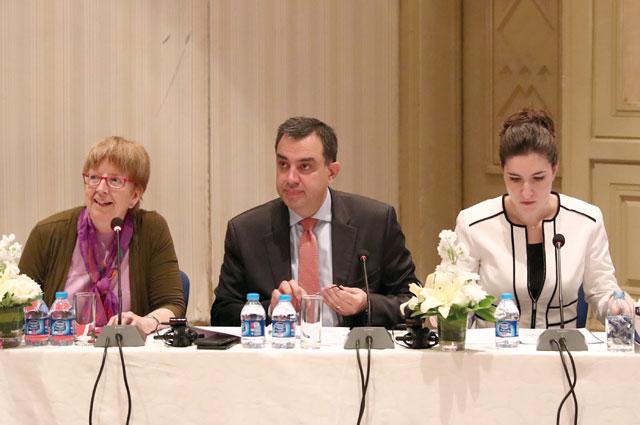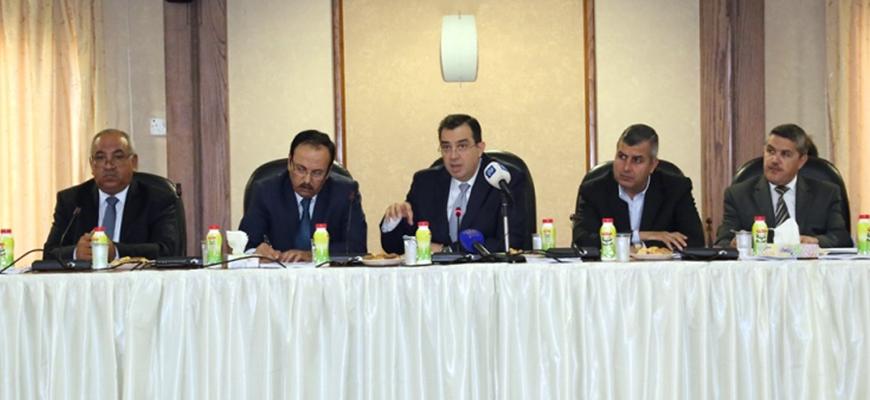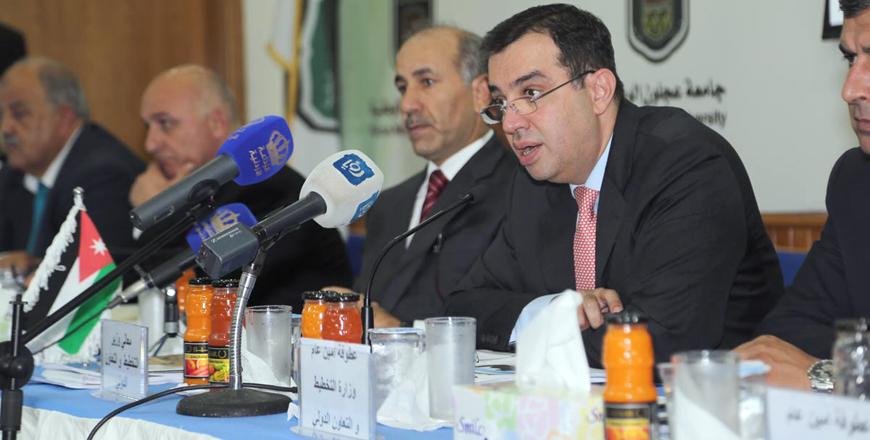You are here
Planning ministry, World Bank prepare study on urban growth scenarios
By Ana V. Ibáñez Prieto - Feb 27,2018 - Last updated at Feb 27,2018

Planning Minister Imad Fakhoury speaks to partners at an event to announce the findings of a study in Amman on Tuesday (Photo courtesy of Ministry of Planning)
AMMAN — The Planning Ministry and the World Bank on Tuesday presented a study on “Urban Growth Scenarios for 2030” for five cities across the Kingdom, comparing different economic, environmental and social outcomes based on three different urban growth plans.
The project, prepared in partnership with the Mexican Capital Sustainable, was implemented in the governorates of Mafraq, Irbid, Rusaifa, Zarqa and Amman.
The study revealed that integrated urban growth policies and planning can lead to environmental, social and economic benefits such as the absorption of the population increase derived from the refugee crisis, the reduction of the annual cost of municipal services and the prevention of greenhouse emissions.
The presentation ceremony was opened by Planning Minister Imad Fakhoury, who highlighted that the report is “the first of its kind in the Middle East,” noting that it “represents the cumulative efforts of the local community and stakeholders in becoming pioneers in the region”.
“Plans for local development are the foundation for success and the Planning Ministry believes in the optimal utilisation of international assistance to achieve sustainable growth,” Fakhoury explained, calling on other governmental agencies to “adopt the findings of the study and establish mechanisms to strengthen the capacities of the governorates to integrate all efforts for growth”.
“We have witnessed the negative results of random urban planning and the current pressure faced by the municipalities,” the minister added, stressing the need for policymaking related to issues such as solid waste management and renewable energy plans.
The ceremony continued with the remarks of World Bank Programme leader Ibrahim Dajani, who highlighted that “the way in which the cities expand has long term implications for both citizens and governments,” noting “the challenges faced by the Kingdom due to the unplanned population growth resulting from the refugee influx”.
In this regard, Dajani expressed hope for the study to “assist policy makers in the promotion of sustainable growth, providing solutions to challenges such as the infrastructure of the city, energy and water consumption and distribution”.
Project Director Carmen Valdez presented the main findings of the study, highlighting that its strength relies on the fact that it provides institutions with indicators to be used when preparing growth policies.”
“This way, each institution will be able to assess the impact of its policies,” she added, noting that “municipalities will be able to craft a common growth project that takes into account all concerned parties.”
During the discussion session on the results, Irbid Mayor Hussein Bani Hani lamented “the fact that half of the Jordanian population is agglomerated in Amman,” stressing that “this clearly shows that the Kingdom is facing issues related to misplanning and random growth.”
“We keep on hearing the central government saying that they are keen to support the municipalities, but this is not tangible on the ground”, the mayor added, noting that “the municipalities are drowning with the resources consumed by the refugee crisis, and the government shall allocate funds granted by the International community for the implementation of projects at the municipal level”.
“We can’t blame the central government for all the issues faced by the governorates”, Fakhoury replied, stressing that “it is a shared responsibility and we acknowledge the efforts made by the municipalities”.
“The problems that the region is facing are unprecedented, but it is undeniable that Jordan has made progress in the past years.”
Related Articles
AMMAN — Five municipalities in Jordan are making use of a new one-year project run by the Planning and International Cooperation Ministry an
ZARQA — The government is expected to spend JD318.155 million on the Zarqa Governorate development programme between 2016 and 2018, Planning
AMMAN — The government is expected to spend JD124 million on the Jerash Governorate development programme between 2016 and 2018, Planning an



















